In this article:
A sore throat is the second most common acute infection seen by family physicians and is predominantly a disease of youth and children in their early school years.

The problem is more common in autumn and winter.
Natural Treatment Options for Sore Throat in Children
Here are some home remedies for sore throat in children.
1. Salt water gargle can help
If your child is old enough to gargle, one of the best ways to get relief from a sore throat is gargling with salt water.
A 2005 study published in the American Journal of Preventive Medicine found that simple water gargling was effective in preventing URTIs among healthy people. This virtually cost-free modality would appreciably benefit the general population. (1)
Salt works like an antiseptic and helps draw out the mucus. This cuts down the phlegm and reduces inflammation, giving your child instant relief. Also, the warm salty water is soothing on your throat.
How to perform:
- Mix ½ teaspoon of salt into a glass of warm water. If needed, add a small amount of honey to improve the taste.
- Make your child gargle with the solution, and remind him or her to spit the water out after gargling.
- Do this several times a day for best results.
2. Offer warm fluids

Drinking warm fluids will also provide comfort to children suffering from a sore throat.
First of all, warm fluids will help keep the body hydrated, which is very important as fluids help thin excess mucus. Secondly, when the throat is raw and inflamed, drinking warm beverages keeps it moist and comfortable.
In a 2008 study published in the journal Rhinology, researchers analyzed the benefits of hot drinks over drinks at room temperature in providing relief from most symptoms of common cold and flu. It was found that hot drinks provided immediate and sustained relief from symptoms of sore throat, whereas the same drink at room temperature only provided relief from symptoms of runny nose, cough, and sneezing. (2)
You can offer lukewarm water or warm lemonade. Hot chocolate, warm milk and weak tea can also be offered. Homemade bone broth or light soups made with bone broth are also good.
If your child refuses large amounts of fluids at one time, give smaller amounts more often.
3. Steam inhalation can be beneficial
While steam inhalation is beneficial, the risk of an accident is high with small children. For this reason, most parents are not comfortable with it.
However, to relieve a sore throat, warm steam created from a hot shower can be effective. The warm steam helps alleviate congestion and make breathing a bit easier. The warmth of the moisture will also thin the mucus to make it easier to expel.
In a 2015 study published in the IOSR Journal of Dental and Medical Sciences, researchers investigated the efficiency of steam inhalation as adjunct treatment with inhalant capsules in relieving the respiratory symptoms of common cold and found that there was better and quicker relief in symptoms when steam inhalation was used. (3)
How to use:
- Run a hot shower and keep the bathroom door shut to prevent steam from escaping.
- Sit with your child in the bathroom, inhaling the steam for at least 30 minutes. (Do not leave your child in the bathroom alone.)
- Repeat as needed.
4. Humidify your surroundings
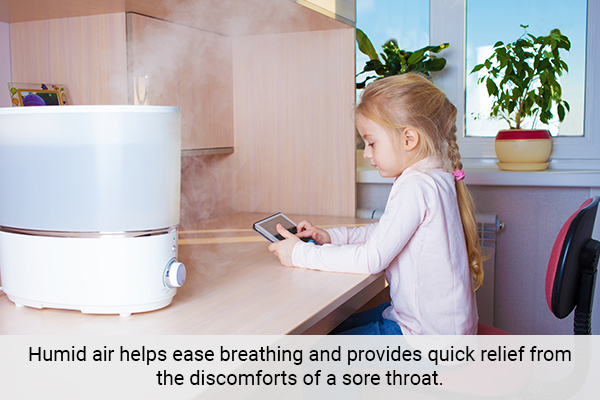
A 2009 study published in Respiratory Medicine found cold temperature and low humidity to be associated with increased occurrence of respiratory tract infections and a decrease in temperature and humidity preceded the onset of the infections. (4)
Humid air helps ease breathing and provides quick relief from the discomforts of a sore throat. So, you need to increase the level of humidity in your home and especially where your child sleeps.
Moist air can also help with congestion and lessen the intensity of coughing fits associated with a sore throat.
How to use:
- Use a humidifier wherever possible in your home, especially in the room where your child sleeps.
- Alternatively, you can place a bowl of hot water in the room to increase the moisture in the air. You can also place a pot of water on the radiator in your child’s room.
Be careful to place humidifier or a bowl of hot water in a safe place to prevent accidents. Also, keep it clean to prevent mold growth.
5. Try using lemon for relief
You can use fresh lemons to get relief from a sore throat as they help remove mucus.
Being rich in vitamin C, lemon also helps boost the immune system and assists the body in fighting the infection that is causing the sore throat. Its antibacterial and anti-inflammatory properties also help reduce associated symptoms, such as a runny nose and coughing.
Lemon works better when combined with honey. A 2017 study found that honey and lemon juice has promising antibacterial activity against bacteria that causes respiratory tract infections with relatively higher sensitivity to Staphylococcus aureus and streptococcus pyogenes. (5)
The streptococcus group of bacteria is the main cause behind sore throat infections.
How to use:
- Put the juice and peels from 4 lemons and 1 tablespoon of ginger slices in a pan.
- Add enough boiling water to cover the ingredients.
- Cover and let it steep for 10 minutes.
- Strain the liquid.
- Dilute this liquid with an equal amount of warm water and add raw honey for taste.
- Give your child this hot lemonade to drink, a few times a day.
Note: For babies younger than 1 year, add sugar instead of honey for taste.
6. Use honey
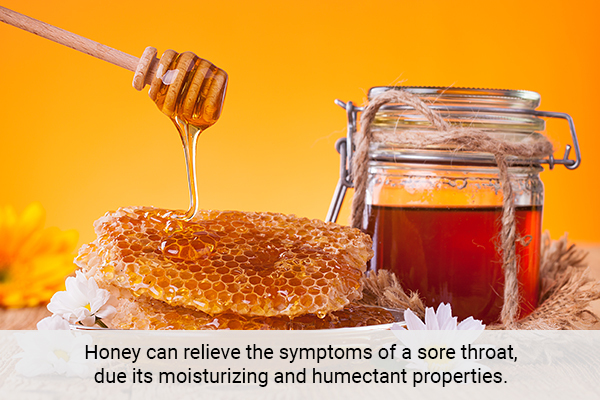
Honey is a safe remedy for children age 1 and older who are suffering from a sore throat.
Honey can relieve the symptoms of a sore throat, due to its moisturizing and humectant properties. It also contains antibacterial, antimicrobial and antiseptic properties that fight the microbes that cause a sore throat.
In a 2016 study published in the Asian Pacific Journal of Tropical Biomedicine, researchers noted that honey showed distinguished antibacterial activities against the most common bacteria causing respiratory infections with varied sensitivity. (6)
It is also good for your child’s immunity.
- Mix 1 tablespoon of raw, organic honey into a cup of warm water. Stir well and give it to your child to drink, 2 or 3 times a day.
- Alternatively, mix 1 tablespoon each of honey and lemon juice into a cup of lukewarm water. Make your child sip the mixture slowly, a few times a day.
- Before going to bed, add 1 teaspoon of honey to a glass of warm milk and offer it to your child.
Caution: As raw honey can carry harmful bacteria that can cause infant botulism, you should never feed it to babies under 1 year of age.
7. Consume ginger
Ginger is another good home remedy for treating sore throat in children. It has anti-inflammatory, antiviral and antitussive (cough-suppressant) properties that help reduce congestion and relieve the symptoms of a sore throat.
A 2002 study published in the East African Medical Journal highlights the antibacterial activity in ginger and found that it can kill some strains of bacteria responsible for respiratory tract infections. (7)
Another 2005 study published in the Journal of Ethnopharmacology shows that one of the main bioactive components of ginger possesses analgesic and anti-inflammatory properties. (8) This means that ginger can help reduce throat inflammation, also reducing the sensation of pain, commonly associated with a sore throat.
Plus, it boosts the immune system to help speed up recovery.
How to consume:
- Mix 1 teaspoon each of ginger juice and honey. Give it to your child to relieve throat discomfort. Follow it up with a cup of warm milk. Do this twice daily.
- Alternatively, pour 6 cups of water into a pan and add ½ cup of thinly sliced ginger and 2 cinnamon sticks. Simmer it on low heat for 20 minutes, then strain it and add a bit of raw honey. Give it to your child to drink several times a day.
- Also, you can give older children ginger slices with a little salt sprinkled on them to chew on.
8. Use turmeric for sore throat relief
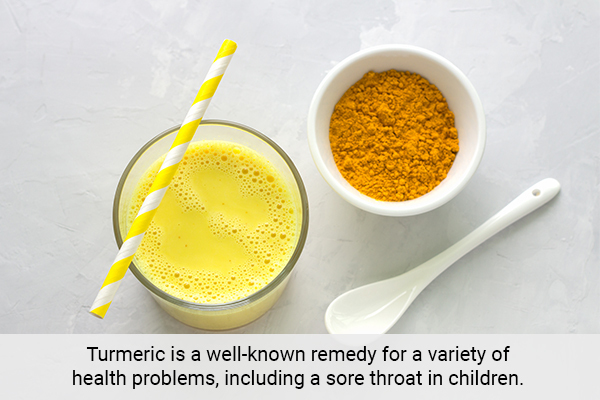
In Ayurveda, turmeric is a well-known remedy for a variety of health problems, including a sore throat in children. Most of the medicinal property of turmeric comes from the compound curcumin.
The hexane and methanol extracts of curcumin demonstrated antibacterial effects against 13 bacteria, including streptococcus group of bacteria. (8)
As suggested by a 2013 study, the herb also exhibits antimicrobial and immune-stimulatory activity, making it one of the most valuable home remedies for sore throats. (9)
While its anti-inflammatory properties help reduce inflammation in the airways to make breathing easier, it also boosts the immune system to help fight any kind of infection.
How to consume:
- Add 2 teaspoons of turmeric powder to a glass of hot milk. Sweeten with a little honey and give it to your child to drink twice daily to soothe the sore throat.
- Also, you can gargle with turmeric to soothe a bad throat. Add ½ teaspoon each of turmeric powder and salt to a glass of warm water and mix it well. Make your child gargle with this mixture twice daily.
Causes of Sore Throat in Children
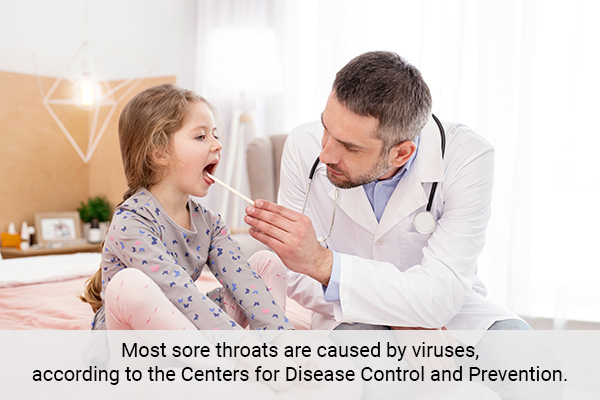
Most sore throats are caused by viruses, according to the Centers for Disease Control and Prevention (CDC). (10)
About one-third of sore throats in children aged 5 to 15 years are caused by a throat infection from the A β-hemolytic streptococcus group of bacteria, according to a 2007 study published in Canadian Family Physician. (11)
Other common causes of sore throats include:
- Allergies
- Dry air
- Weak immunity
- Acid reflux
- Exposure to someone with an infection that causes a sore throat
- The flu
- A common cold
- Pollution (airborne chemicals or irritants)
- Exposure to secondhand smoke
Signs and Symptoms of Sore Throat in Children
Signs and symptoms of a sore throat in children include:
- Painful throat
- Pain when swallowing
- Fever
- Swollen glands in the neck
- Bad breath
- Scratchiness in the throat
- Sneezing
- Hoarse voice
- Watery eyes
- Cough
- Redness in the back of the mouth
A sore throat can also result in excessive crying, crankiness, and refusal to eat or drink most foods. This can worsen the situation.
Preventing Sore Throat in Children
You cannot completely prevent the chances of your child coming down with a sore throat, but you can take the following precautions that may reduce the chances of a sore throat.
- Wash hands regularly to prevent the spreading of infection.
- Use alcohol-based hand rubs in case washing hands is not possible.
- Use tissues to cover the mouth when sneezing or coughing. Dispose of these tissues immediately.
- Sneeze/cough into the sleeve of one’s clothing (at the inner elbow).
- Wash hands after coughing, blowing the nose, or sneezing.
- Limit contact with anyone who is sick.
Additional Tips to Manage Sore Throat in Children
- Keeping the throat warm helps soothe inflammation. So, wrap something warm around your child’s neck.
- A warm oil massage is excellent for a sore throat, as it warms up the area and soothes the pain.
- Offer mild chamomile tea to soothe a sore throat and even clear any congestion that accompanies it.
- Give a mixture of ¼ tablespoon of cinnamon and 1 tablespoon of honey to your child once daily for relief from a sore throat.
- Give your child ice chips, popsicles or throat lozenges to suck on to help keep the throat adequately moist.
- Do not make your child talk too much. Encourage him or her to give their throat a rest.
- Avoid common irritants like fried foods, cold drinks, and hard foods like nuts and biscuits that can aggravate a sore throat.
- Pay attention to the air quality that your child is breathing. Avoid exposing your child to highly polluted areas, as it can trigger a sore throat.
- Include plenty of fresh and organic fruits and vegetables in your child’s diet.
- Don’t allow smoking around your child. Exposure to tobacco smoke is a common trigger for a sore throat.
- Make sure your child gets adequate sleep and rest for faster recovery.
- Elevate your child’s head with an extra pillow at night, so that mucus can drain.
When to See a Doctor
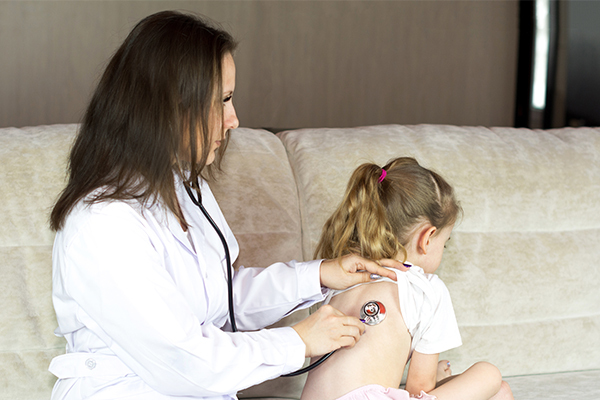
Seek medical help if your child has a sore throat along with any of the following symptoms:
- Difficulty in swallowing or breathing
- Excessive drooling
- Temperature equal to or more than 101°F or 38.3°C
- Swelling of the neck
- Inability or unwillingness to drink or eat
- Muffled voice
- Difficulty opening the mouth
- Stiff neck
Caution: Some remedies listed below contain honey. For babies younger than age 1, use sugar instead of honey for taste. Raw honey can carry harmful bacteria that can cause infant botulism. (12)
Final Word
Most cases of sore throat, particularly those caused by viruses, will resolve on their own without antibiotics. You can, however, use the above-mentioned remedies to get symptomatic relief and speed up recovery.
- Was this article helpful?
- YES, THANKS!NOT REALLY



